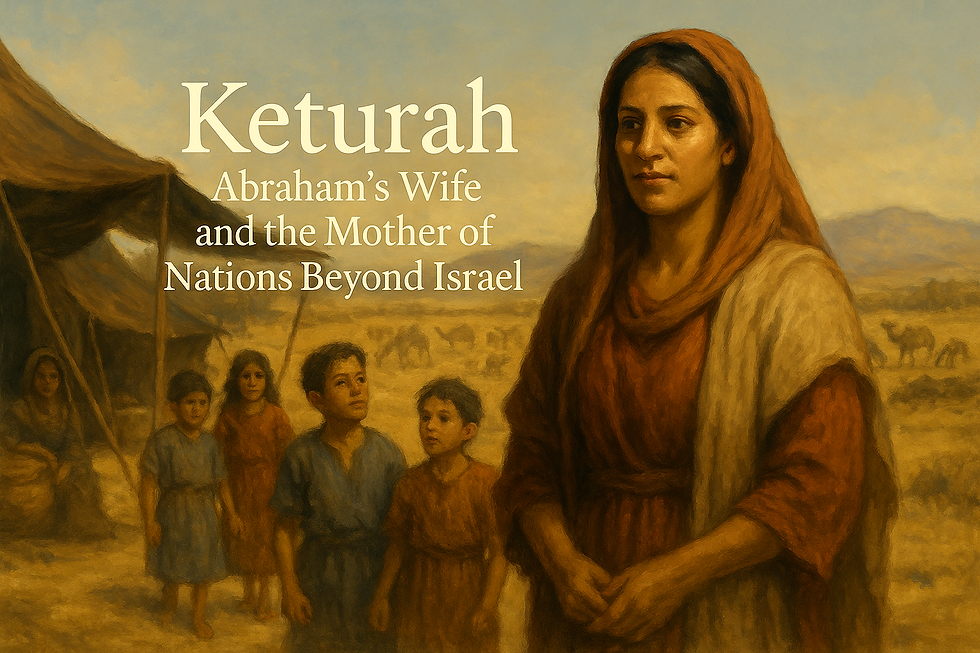Keturah: Abraham’s Wife and the Mother of Nations Beyond Israel
- Bible Believing Christian

- Sep 3, 2025
- 3 min read

Keturah: Abraham’s Wife and the Mother of Nations Beyond Israel
After Sarah’s death, Abraham took another wife named Keturah. Though mentioned only briefly in Genesis, her role in the covenant story is significant. Through her, Abraham fathered six sons who became the ancestors of nations that later played important roles in biblical history. Keturah’s story reminds us that God’s promises to Abraham extended beyond Israel, and that His providence shaped not only one people but the wider nations of the world.
Name & Etymology
The name Keturah (קְטוּרָה, Qəṭūrāh, pronounced keh-too-rah) is thought to mean “incense” or “fragrance.” This meaning suggests beauty and significance, perhaps reflecting the way her life added to Abraham’s legacy. In the Septuagint, her name appears as Khetoura (Χετούρα).
Biblical Narrative (The Story)
Keturah is introduced in Genesis 25:1: “Abraham married another wife, whose name was Keturah.” She bore him six sons: Zimran, Jokshan, Medan, Midian, Ishbak, and Shuah (Genesis 25:2).
The text records that Abraham gave gifts to the sons of his concubines and sent them away to the east, while Isaac alone received the full covenant inheritance (Genesis 25:5–6). Yet the children of Keturah became numerous, founding tribes and peoples who appear throughout the biblical narrative.
Most notably, Midian became the ancestor of the Midianites. Moses fled to Midian, married Zipporah (the daughter of Jethro, a Midianite priest), and received counsel from his Midianite father-in-law (Exodus 2–18). The Midianites later became both allies and adversaries of Israel.
Keturah’s descendants represent Abraham’s broader role as the father of many nations, beyond the covenant line of Isaac.
Historical & Cultural Context
In the patriarchal period, it was not unusual for men of Abraham’s stature to have more than one wife or concubine, especially in later life. Keturah’s marriage to Abraham after Sarah’s death reflects cultural practices of extending legacy and family influence through multiple descendants.
Her children were sent eastward, a move that distinguished Isaac as the heir of promise while still acknowledging the fruitfulness of Abraham’s other lines. This division foreshadowed future interactions—sometimes peaceful, sometimes hostile—between Israel and these related nations.
Character & Themes
Keturah herself is presented without extended narrative detail, yet her legacy reveals key themes:
Fruitfulness: Even in old age, Abraham fathered children through her, showing God’s blessing on his life.
Nations Beyond Israel: Her children remind us that God’s purposes extend beyond one family or tribe.
Separation and Inheritance: The division between Isaac and Keturah’s sons highlights God’s sovereign choice of the covenant line.
Connection to Christ
While Isaac carried the covenant line to Christ, Keturah’s children point to the broader truth that God’s promises to Abraham involved blessing “all nations” through his seed (Genesis 12:3). Christ is not only the fulfillment of Israel’s hope but the Savior of all peoples.
The presence of the Midianites in Moses’ story underscores this connection. God used a descendant of Keturah (Jethro) to shape Moses’ leadership and affirm his mission. In this way, the line of Keturah played a role in preparing the way for God’s redemptive plan.
Theological Significance
Keturah’s story highlights the wideness of God’s purposes. Abraham was not only the father of Isaac and Jacob but also of many other nations. Though Isaac alone carried the covenant, Keturah’s children remind us that God’s plan for redemption always included the nations.
Her life also illustrates the distinction between God’s covenant promises and His common blessings. Keturah’s children were blessed and became great peoples, but the unique inheritance of God’s covenant went to Isaac.
Myths & Misconceptions
One misconception is that Keturah was only a concubine. While some texts call her a concubine (1 Chronicles 1:32), Genesis 25:1 calls her Abraham’s wife, showing her honored place in his household.
Another misconception is that her children were insignificant. In reality, they became powerful tribes and nations, some of whom played key roles in Israel’s story.
Some also assume Keturah’s story diminishes Sarah’s role. In truth, Sarah remained the covenant matriarch, while Keturah represents Abraham’s extended fruitfulness and the breadth of God’s purposes.
Application
Keturah’s life reminds us that God’s purposes extend further than we often imagine. His blessings on Abraham included not just Israel but many nations, preparing the way for Christ to bless the whole world.
Her story also challenges us to value those who may seem like “secondary” figures. Though she appears briefly, her legacy influenced generations and the unfolding story of redemption.
Conclusion
Keturah, Abraham’s wife after Sarah, became the mother of nations beyond Israel. Through her sons, Abraham’s influence spread across the ancient world. While Isaac carried the covenant line, Keturah’s children remind us of God’s promise to bless all nations through Abraham’s seed. Her life, though briefly mentioned, carries profound significance in the story of God’s faithfulness and the scope of His plan of salvation.


